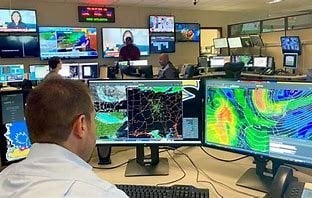Reality check: will federal budget cuts REALLY mean we can’t forecast hurricanes?

Photo above - believe it or not, this is how hurricane severity is predicted - bunch of guys staring at PC monitors. Could AI possibly offer an edge?
If I were asked, I’d vote for more air traffic controllers, instead of weathermen. There have been a number of well publicized airport glitches and outages recently. And apparently a half dozen more that barely made a ripple in the media. Experts are still trying to sort out if this is hacking, bad software, or rookies in the control tower pressing the wrong buttons. We await their findings.
Let’s turn our attention to weathermen, instead. The link below (“States and cities fear a disaster season”) is hilariously misleading. The article features plenty of rants from federal agency big shots. They warn that there could be a disaster if their budgets are reduced, even a smidgeon. And a bunch of ordinary homeowners who got 2022 FEMA checks were interviewed. Which proves exactly nothing when it comes to forecasting 2025 hurricanes. FEMA is an agency that helps you rebuild in that same dangerous location right after you got flooded or flattened.
I yield to no one in my admiration for rainbow colored satellite images pinwheel shaped hurricanes, or iPhone videos of alligators swimming alongside Ford 150 Platinum Lariat pickups on flooded Florida cul-de-sacs. But I’m skeptical that culling a few steers from the herd of 12,000+ NOAA employees is going to mean that Hurricane Wendy will sneak up on us. (Wendy is one of the official names for 2025 hurricanes, when they reach the starting grid).
But there’s hope on the horizon. Heads of NOAA, FEMA, the National Weather Service, and NEMA (the National Emergency Services Association) should probably take a look at the second link below: “AI weather tool surpasses current forecasts”. That is going to send a chill down the spine of a LOT of GS 12 weather forecasters, no?
AI software programs excel because they use “machine learning”. This is the same approach being used to diagnose and cure cancer and otherl diseases. The “Aurora” program, had it been listened to, accurately predicted the path of typhoons like Doksuri. Aurora and it's brethren are apparently FAR more accurate than a platoon of weathermen with plastic pocket protectors puzzling over satellite snapshots.
Every spring the folks at the National Weather Service tell us the same thing: Expect a more active hurricane season this year. Because of climate change, El Nino, La Nina, sunspots, Canada’s jet stream stepped out of bounds or whatever. No agency will ever get a bigger budget and more headcount by predicting FEWER hurricanes and tornados. But in fact, we’ve had a multi-year lull in hurricane activity for much of the past several decades. 2024 was forecast to be one of the “worst ever” by NOAA. Instead, it was below average. The same “worst in memory” predictions are being recycled for the 2025 season, as a defense against budget cuts. See CBS link at bottom.
I don’t expect that AI weather forecasts like Aurora will be perfect. But I do think they will be better than whatever NOAA has been using to serve up the same hurricane predictions year after year.
And my apologies in advance to homeowners who rebuilt in storm surge areas after previous hurricanes. If your place is destroyed again, don’t blame NOAA, FEMA, NEMA, or the National Weather Service budget cuts. It was your own decision to rebuild in a high-risk zone, after getting federal disaster relief funds. But you're not alone. California homeowners keep rebuilding in the fire zones, too.
I’m just sayin’ . . .
States and Cities Fear a Disaster Season Full of Unknowns Amid Federal Cuts – DNyuz
A new AI-based weather tool surpasses current forecasts
Why South Florida can't let its guard down for the 2025 hurricane season, no matter the forecast - CBS Miami














